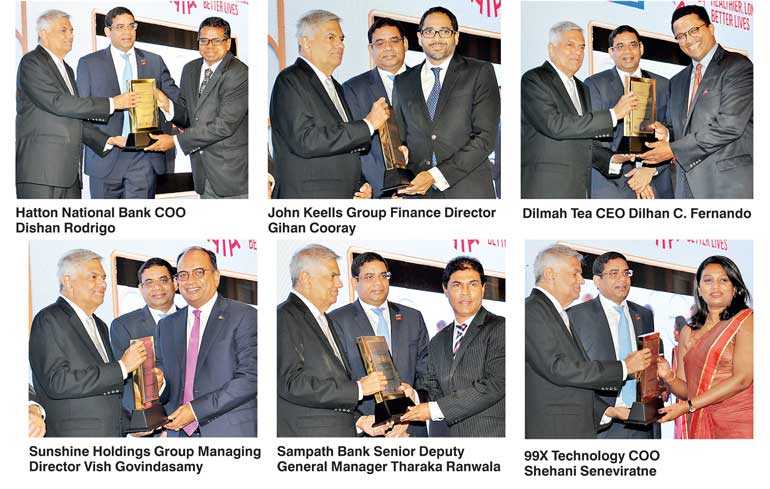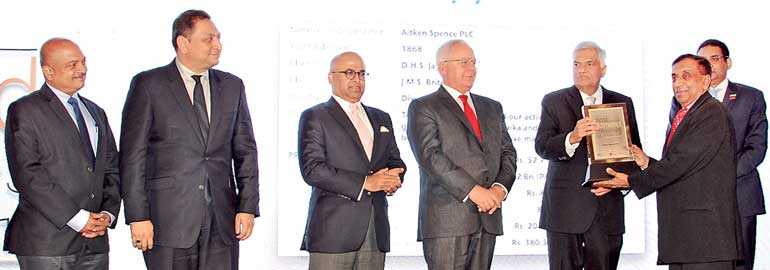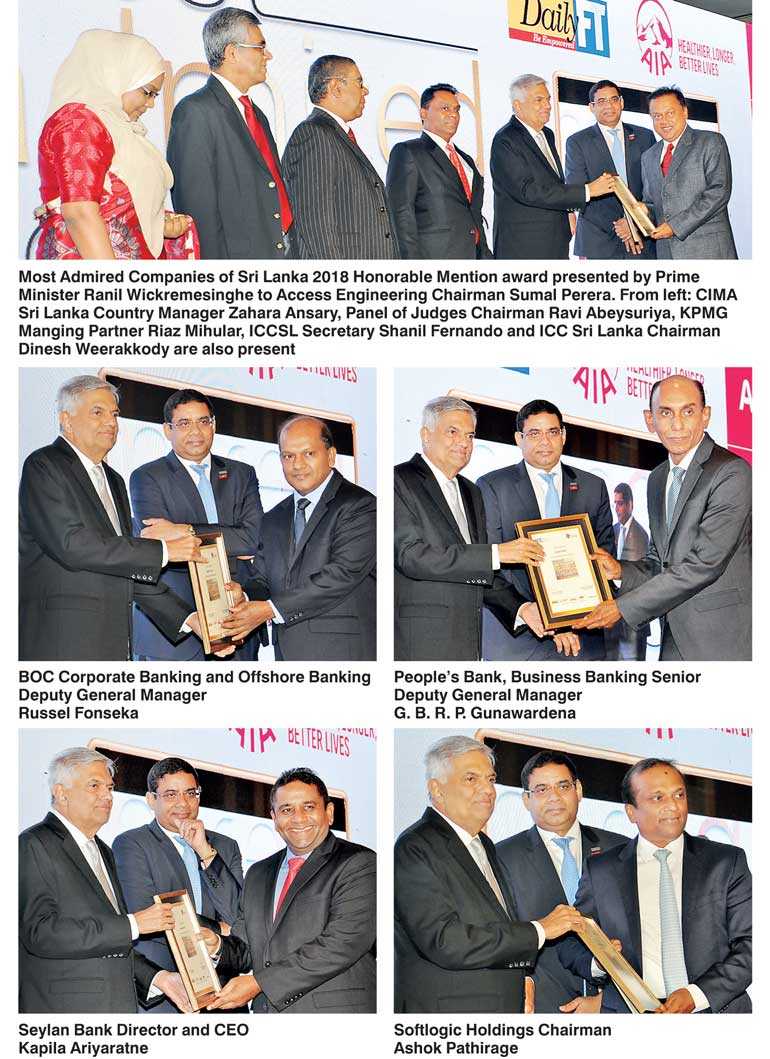Sunday Feb 15, 2026
Sunday Feb 15, 2026
Tuesday, 11 September 2018 00:00 - - {{hitsCtrl.values.hits}}


 Most Admired Companies of Sri Lanka 2018 award presented by Prime Minister Ranil Wickremesinghe to Aitken Spence Deputy Chairman and Managing Director J.M.S. Brito. From left: Daily FT Editor-in-Chief Nisthar Cassim, AIA CEO Pankaj Banerjee, ICC India President Jawahar Vadivelu, CIMA President Steven Swientozielskyj and ICC Sri Lanka Chairman Dinesh Weerakkody are also present
Most Admired Companies of Sri Lanka 2018 award presented by Prime Minister Ranil Wickremesinghe to Aitken Spence Deputy Chairman and Managing Director J.M.S. Brito. From left: Daily FT Editor-in-Chief Nisthar Cassim, AIA CEO Pankaj Banerjee, ICC India President Jawahar Vadivelu, CIMA President Steven Swientozielskyj and ICC Sri Lanka Chairman Dinesh Weerakkody are also present
Policymakers and companies have to use technology to create social equity, an expert said this week, pointing out that inequality could only be addressed by giving people skills that would be useful in the future and creating opportunities to enable them to deploy those skills.
India Aon Hewitt Consulting CEO Sandeep Chaudharyat delivering the keynote at the ceremony to award the ‘Most Admired Companies of Sri Lanka’ at the Shangri-La, Colombo outlined the pros and cons created by technology that stakeholders had to tackle when navigating global markets and economies.
The awards were organised in partnership with the International Chamber of Commerce, Sri Lanka (ICCSL) and the Chartered Institute of Management Accountants (CIMA) Sri Lanka.
Aitken Spence, Commercial Bank of Ceylon, DFCC Bank, Hayleys, Hatton National Bank, John Keells Holdings, MJF Group, Sampath Bank, Sunshine Holdings, and 99X Technology were named as the Most Admired Companies. Access Engineering, Bank of Ceylon, People’s Bank, Seylan Bank and Softlogic Holdings received accolades as Honourable Mentions at the event.
“This is the golden period for humanity. The biggest challenge that we see in the world today is not terrorism or climate change or water. I fundamentally believe for business leaders the biggest challenge is the lack of meaningful jobs given to people. We are likely to see things that are more like science fiction and lesser as jobs. We can sit and argue about how technology is shaping our future and how it’s different from the last two centuries. Just in the last three years there is technology that can self-learn and think on their own, which is quite different from how humans are acquiring skills. This is what I would call the era of technological unemployment,” he said.
However, the technology can be used to increase productivity and give allow humans to have a more creative role. Chaudharyat pointed out that technology creates an abundance for economies that can be viewed as a positive since it gives access to goods and services at more affordable levels.
“Yet I would only be more expected about the situation we are in for two reasons. One is the leveraging of technology is also creating economic abundance. People might argue that is shallow materialism but the expectation is for any economy is to increase production and at the same time increase access by bringing down costs. Secondly it gives employees the chance to put their skills into areas that are much more fulfilling to the human race. Technology is creating and converging new industries,” he said.
“The progress that we are going to see in this part of the world is not necessarily about corporate profit. It is about the profit to the country, in terms of natural resources and the people who need to benefit from the economic prosperity. The down side of technology that we sometimes ignore is that 50% of global wealth is concentrated amongst just nine people so it’s also created a polarised society like we have never seen before. The inequality that we currently see in the world is unprecedented and if we continue ignoring that I would imagine we are sitting on a ticking time bomb, which may essentially blow up, making what we have right now transient.”
With all this wealth of technology policy makers and business leaders have to consider how they can empower consumers and redistribute wealth so that everyone across the social spectrum can have better lives.
“Decisions will be more about rewarding every Sri Lankan by giving them access to prosperity and progress from economic growth. What the public is asking for is not hugely different, they are not asking for something we would not be able to deliver as a nation, they are really asking for skills that will be relevant in the future and an opportunity to deploy that skill set. The aim is to create a country not where the poor are driving cars but the rich are using public transport. That is how Sri Lanka can become a breakout nation, even better than examples seen in many of the Western countries.”

Pix by Ruwan Walpola and Sameera Wijesinghe